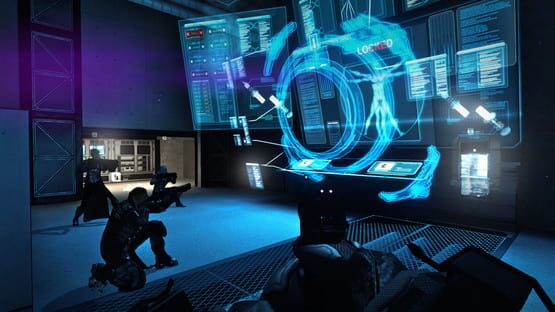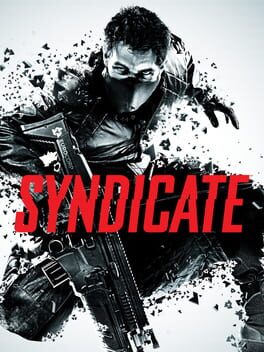

Set in 2069, Syndicate takes players into a dark, Machiavellian world run without government oversight with many syndicates vying for total dominance of their local market place. With no one to question their intentions or actions, three mega corporations - Eurocorp, Cayman Global, and Aspari - are at the forefront of this brutal war for control of the pivotal American market. In the world of Syndicate, everything is digitally connected, including the people. Players aren't limited to the weapons in their hands. Through DART 6 bio-chip technology implanted in their head, players can slow down time and breach the digital world around them to take down their foes using a variety of upgradable hacking mechanics. Syndicate's blend of fast-paced, futuristic, action shooter settings and story combined with innovative chip breach gameplay instantly immerses players in a unique digital world.
Reviews View More
My biggest issues were with the quick time events and the blinding lens flares. I can appreciate that this is a product of it's time though and reminded me of playing Xbox 360 games back in the day.
The game is quite forgettable with a cliche story but I enjoyed my short time with it.
You spend about 90% of the game's runtime as a roided-up corporate slave until the main protagonist arbitrarily decides to ruin the plans of his superiors. By this point, however, you've already committed Geneva-shattering levels of corporate espionage against rival corporations, slaughtered dozens upon dozens of the actual rebels fighting against the state, and either aided in (or at least have been privy to) the needless slaughter of innocent civilians. Cyberpunk, as a genre, has always had a strong anti-capitalist and anti-imperialist bent to it: most cyberpunk stories (the good ones, anyway) focus on the underdogs etching out an existence in a decaying world with a sharp divide between the haves and the have-nots. For Syndicate to thoroughly misinterpret that crucial anarchic aspect of the cyberpunk genre demonstrates a lack of understanding of said genre: Syndicate uses cyberpunk as an aesthetic rather than any legitimate theming.
The reason your guy goes against EuroCorp is because of a generic backstory where his parents were murdered and the main villain lied about it so he could groom him into becoming the perfect instrument of murder. Bias is what drives your character to rebellion, not the ideology of the actual rebellion whose members you shot to death about two levels ago. Miles Kilo is only nominally a hero: he's a vital asset to corruption and police brutality until the game decides that it's time for you to shoot up his coworkers for the big, dramatic climax. It's hard to feel like you've changed the world for the better when the main villain kills himself at the end. So what? It's just another corpse in the mass grave of bodies you rack up over the course of the game. Senseless murder dominates the plot, murder that says nothing, achieves little, and absolves no one of anything.
In many ways, the deuteragonist Lily Drawl is a far better 'cyberpunk' character than Miles Kilo. Lily has a compelling and coherent arc: she's a rebel that actively fights for the very things that the cyberpunk genre upholds and makes dynamic, interesting choices in order to achieve those goals. She puts her life at risk and infiltrates the EuroCorp Syndicate as a mole, working all the way up to lead engineer. Once her cover's blown, she's forced on the run, fleeing back into the slums where she was born and raised, and once Kilo almost singlehandedly destroys the rebellion she worked so hard to nurture and engineer, she's forced to take matters into her hands and fight the Powers That Be herself, come hell or high water.
Now that's a fucking arc. That's punk as hell. But Lily's not allowed to be the one who puts an end to EuroCorp: the murderous, thoughtless Kilo is the one responsible for the head honcho's downfall, mere moments after being the one responsible for the sudden, violent end of Lily's liberation front. In many ways, Kilo is less of a character and more of a mindless force of nature, a needlessly destructive whirlwind of death that kills not out of impact or ideology, but out of impulse and idiocy. In short, Kilo is a faceless FPS protagonist: a blank-slate weapon of mass destruction and the most ill-fitting choice for a cyberpunk protagonist.
It's a good thing the game itself is actually pretty fun once you get past the misguided plot. Shooting is responsive and fluid, and the hacking mechanics are clever and well-implemented (for once); mindjacking a guy into suicide or betrayal never got old, and most combat encounters are briskly-paced and high-energy enough to keep you engaged. The sound design is loud and punchy. The minigun is an addicting power fantasy. The million-dollar upgrade that allows you to restore health via melee kills gives Syndicate's combat a uniquely Doom-esque rush that's hard to replicate outside of, well, Doom. And Syndicate mercifully gives you a wide host of vibrant, eye-catching, neon-slathered playgrounds to fight your battles in, so the spectacle is constantly being given an alluring backdrop: if the oversaturated bloom and harsh, overtuned lighting effects were less in-your-face (or adjustable at all beyond a pathetic gamma slider in the options), I'd call Syndicate shockingly ahead of its time on a visual level, barring a handful of janky animations from time to time. The fact that I wanted Syndicate's campaign to be longer so I could shoot more is a good sign at the end of the day: most FPS games from this era clocked out at the 5-hour mark, but Syndicate's gameplay is weirdly invigorating and chock full of adrenaline and catharsis that never quite swings into 'overwhelming'.
Syndicate is a mess, but its flaws usually come with fun caveats that help balance it out somewhat. The plot feels antithetical to the cyberpunk spirit and the main protagonist is a faceless nobody, but the audio logs & supplemental documents build a very fleshed-out world and the supporting cast is full of memorable (albeit somewhat underutilized) characters with actual agendas and ideologies. The lighting is overwhelming and hard to look at, but there's a richly-designed world hiding beneath the figurative and literal bloom. The campaign is way too short, but it's carried by thrilling and kinetic gunplay that's just dynamic enough to ensure that combat encounters don't overstay their welcome. It's a game that views cyberpunk as more of an aesthetic than a theme, but at least it does a good job at selling that aesthetic to the player. Everything clunkily and clumsily balances out into an alright game that might satiate any chooms that wanted to go full-on Arasaka in Cyberpunk 2077. Syndicate could have been more, and it's definitely disappointing in more ways than one, but the superficial pleasures of high-octane gunplay and breakneck virtual violence make the red pill an easier one to swallow.
That dubstep was fucking stupid even back in the day though, and this 'reboot' has practically fuckall to do with the original 1993 game, a tactical asset-management type of game made by Peter Molyneux back when he actually bothered to make games instead of shilling for NFTs. Make of that what you will.
